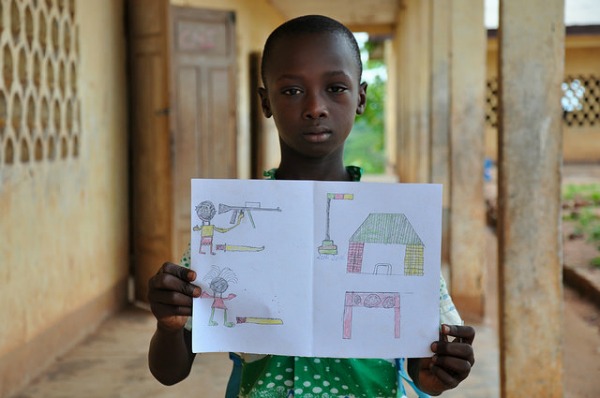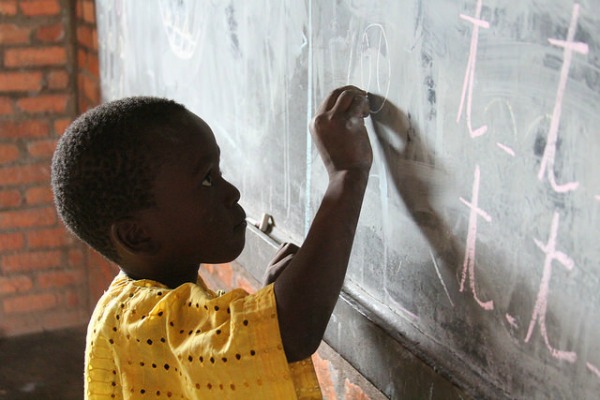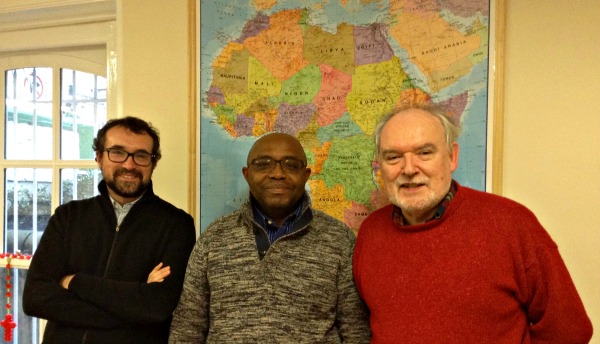
A young boy’s drawing shows his view on life before and after displacement. (Jacquelyn Pavilon / Jesuit Refugee Service).
“How do you become an integrated adult when you’ve been killing people?”
The question drives Fr Eric and Gavin Brasci of the Jesuit Refugee Service (JRS) to search for sustainable answers. On June 12th, World Day Against Child Labour, it is more pertinent than ever. In 2017 the focus is on the impact of conflicts and disasters on children and youth and the work they can be forced into doing as a result.
Forced to fight and kill
JRS is working to provide training and education for youth and children from conflict torn countries in Central and West Africa. Fr Eric Goeh-Akue SJ is Regional Director of JRS West Africa and Gavin Brasci works as Programmes Officer at JRS offices in Rome.
Fr Eric gives examples across the region—in East Cameroon there are more than 200,000 youth without any form of support. They are vulnerable to abduction by armed forces and forced to work as soldiers and sex slaves.
JRS reminds us that “Child soldiers – some as young as six years old – are forced to fight and kill, as well as be involved in activities like espionage, supporting armed groups as informants and messengers, engaging in illicit activities such as drug production. They are also used for sexual exploitation. Many are killed, seriously wounded or imprisoned. They are regular victims of abuse to transform them into violent persons with the result that rehabilitation into society is an enormous challenge.
“There is often a strong link between forced displacement and the forced recruitment of children. Displaced children are an easy target for recruiters since they often lack adequate protection and education and are easier to manipulate.”
In the Democratic Republic of the Congo, the Irish Jesuit Missions with JRS plans to support education in the refugee camps near the city of Goma where more than 700.000 displaced people live far from their homes because of war, internal conflicts and poverty. The children who don’t have access to school because of lack of funds for fees, uniforms and books stay in the streets, and are more exposed to recruitment by armed groups and physical or sexual violence.
A group of 50 primary school students will benefit. In addition, 50 recruited teachers who work in the refugee camps and who have very low qualifications and few materials, will receive training and teacher kits to improve their work.
{youtube}KT-QMwD1zpg{/youtube}
In Chad and the Central African Republic
Fr Eric goes on to describe the reach of education works in Chad: JRS in collaboration with the United Nations, runs 14 refugee camps with playschools, primary and secondary schools. Many of the 35,000 students are Sudanese refugees from Darfur living there since 2006.
Mutara Haru fled Sudan with his mother when he was eight. Until then, his childhood was spent working. “There was not schooling where I was in Sudan. I didn’t even know what education was. In the rainy season we’d farm, and in the dry season we’d graze cattle, and that was life.” Now 20 years old and educated by JRS, he shares his story here.
Fr Eric adds that in the Central African Republic that has 300,000 refugees, Pope Francis has called for help in reconstruction of the country, reconciliation and peace after a devastating eight-year civil war.

In the Central African Republic, Jesuit Refugee Service provides education for children and adults affected by the country’s violence.
Pushed into child labour
According to the International Labour Organisation: “Conflicts and disasters have a devastating impact on people’s lives. They kill, maim, injure, force people to flee their homes, destroy livelihoods, push people into poverty and starvation and trap people in situations where their basic human rights are violated.
“Children are often the first to suffer as schools are destroyed and basic services are disrupted. Many children are internally displaced or become refugees in other countries, and are particularly vulnerable to trafficking and child labour.
“Ultimately, millions of children are pushed into child labour by conflicts and disasters.“
On behalf of those children and young people JRS has been able to save from a life of enforced labour, Fr Eric Goeh-Akue SJ extends heartfelt gratitude to the Irish Jesuit Missions and its supporters for their assistance.

L to R:Gavin Brasci and Fr Eric Goeh-Akue SJ meet John Guiney SJ at the Irish Jesuit Missions
Author: Curated by Irish Jesuit Missions communication, 8th June 2017
All of the Jesuit education works contribute to SDG 4:’ensure inclusive and quality education for all and promote lifelong learning’ of the United Nations 2030 Sustainable Development Agenda.

